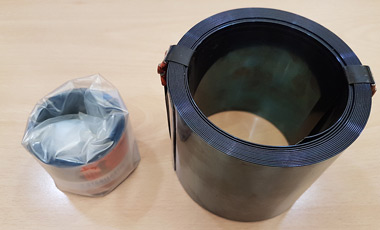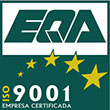Choosing the right material for a metal spiral is critical to ensuring its performance, durability, and the effective protection of screws and guide columns in industrial applications. Every working environment presents unique challenges, such as exposure to extreme temperatures, humidity, abrasive chemicals, or mechanical impacts. This article will help you identify the most suitable material based on the specific conditions of your application, thereby optimizing the life of your machinery.
Key factors for choosing the right material
Selecting the right material involves evaluating various technical factors that directly affect the performance of the metal spiral.
1. Environmental conditions
The environment in which the machinery operates plays a crucial role in determining the right material.
Key Questions:
● Is the machinery exposed to moisture or water?
● Does the environment include corrosive agents, such as chemicals or oils?
● Will it be operated in extreme temperatures?
Recommended Material:
● Stainless Steel: Excellent for wet, corrosive, or temperature-varying environments. Its resistance to oxidation and corrosion makes it ideal for chemical, pharmaceutical or food plants.
● Carbon steel: Suitable for interiors with low exposure to humidity and chemicals. It offers high mechanical strength and is a more economical option for standard applications.

2. Corrosion resistance
If machinery operates in aggressive environments with exposure to chemicals, salts, or saline water, corrosion resistance is a critical factor.
Recommended Material:
● Type 316 Stainless Steel: Specifically designed to resist aggressive chemicals and marine environments.
● Type 304 Stainless Steel: Versatile and suitable for moderately corrosive conditions, such as food processing plants.
3. Operating temperatures
Metal spirals must withstand extreme ambient temperatures without losing their form or functionality.
Recommended Material:
● High Temperature Alloys: Designed for environments exceeding 500°C, such as industrial furnaces or foundry machinery.
● Standard Stainless Steel: Withstands moderate temperatures, up to 400°C, in common applications.
4. Mechanical load and vibrations
The load that the spiral will withstand, as well as constant vibrations, can affect material selection.
Recommended material:
● Carbon steel: Its mechanical strength makes it ideal for applications with high loads or impacts.
● Stainless steel: It offers good resistance to fatigue and is suitable for repetitive or continuous movements.
5. Application compatibility
In addition to environmental conditions, the type of machinery and the specific industry also influence the choice of material.
Examples by industry:
● Food and beverage: Type 304 stainless steel, certified for food contact.
● Pharmaceutical and medical: Type 316 stainless steel, with high chemical resistance and easy to clean.
● Automotive: Carbon steel for standard applications, or special alloys for high-precision systems.
Advantages of selecting the right material
Choosing the right material for your wire spiral provides key benefits:
● Longer life: Environmentally resistant materials reduce premature wear.
● Reduced costs: Fewer replacements and less maintenance extend the life of equipment.
● Increased safety: Robust guards prevent damage to equipment and risks to personnel.
● Regulatory compliance: Materials such as stainless steel ensure compliance with quality and safety standards in regulated industries.

Common errors when selecting materials
Avoid the following errors when choosing the material for your metal spiral:
- Underestimating environmental conditions: Using carbon steel in corrosive environments can cause premature failure.
- Ignoring loads and vibrations: Selecting a less resistant material can cause deformations or breakages.
- Not considering extreme temperatures: An unsuitable material can lose mechanical properties at high temperatures.
Why choose LLUIS CREUS S.L.
At LLUIS CREUS S.L., with more than 150 years of experience, we offer customized solutions to protect screws and guide columns. Our technical team helps you select the ideal material according to your specific needs.
Our Advantages:
● High quality materials: Stainless steel, carbon steel and special alloys.
● Customized designs: Adapted to the dimensions and requirements of your machinery.
● ISO 9001 Certification: Quality assurance and regulatory compliance.

